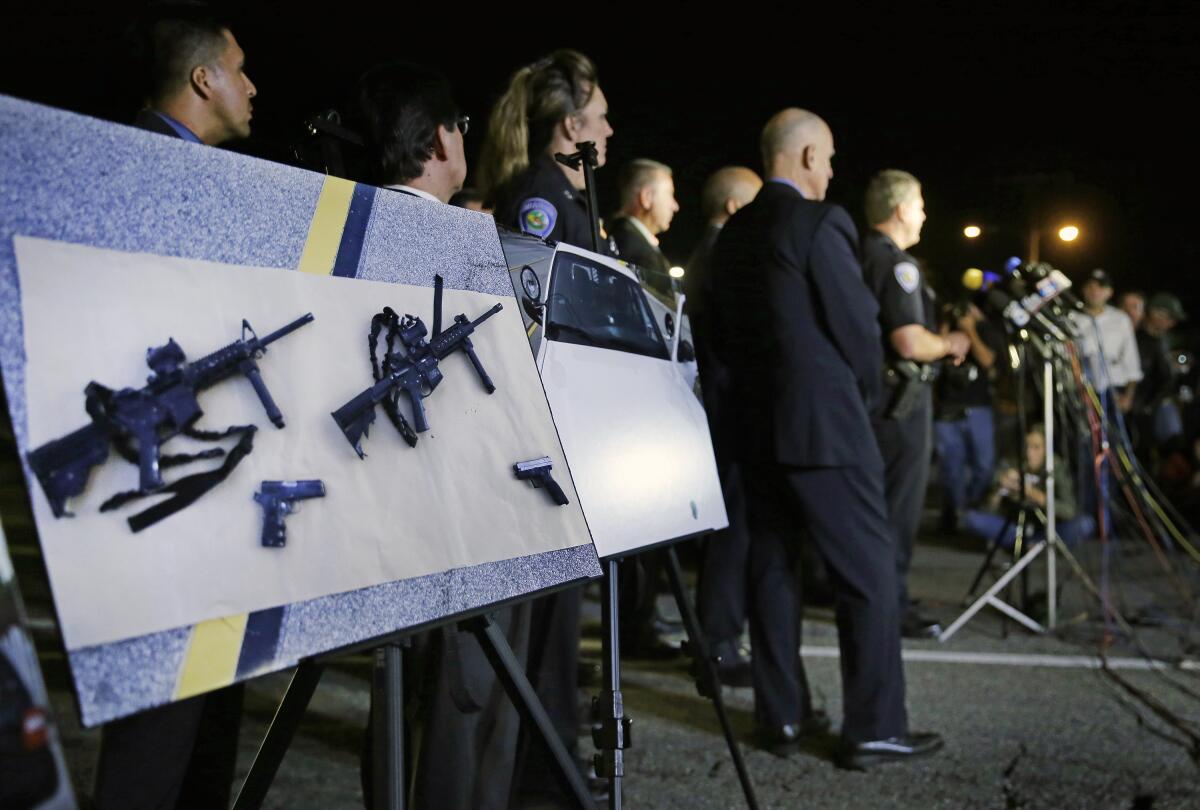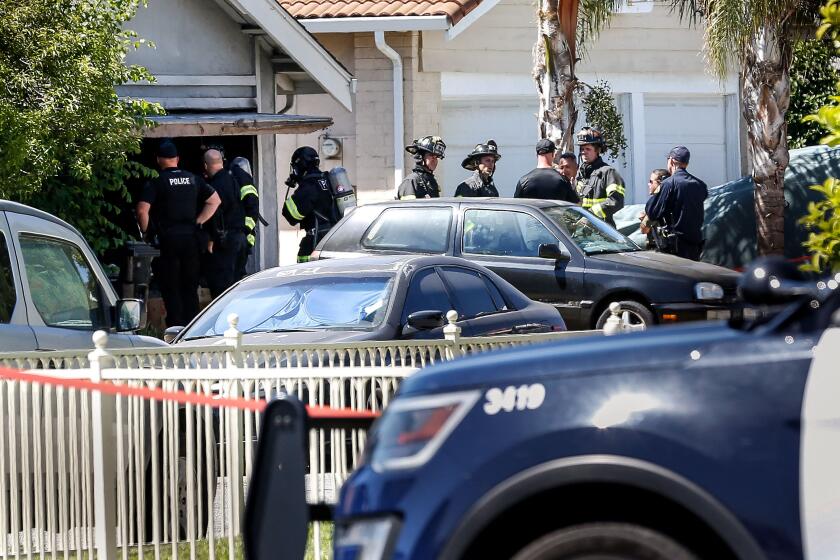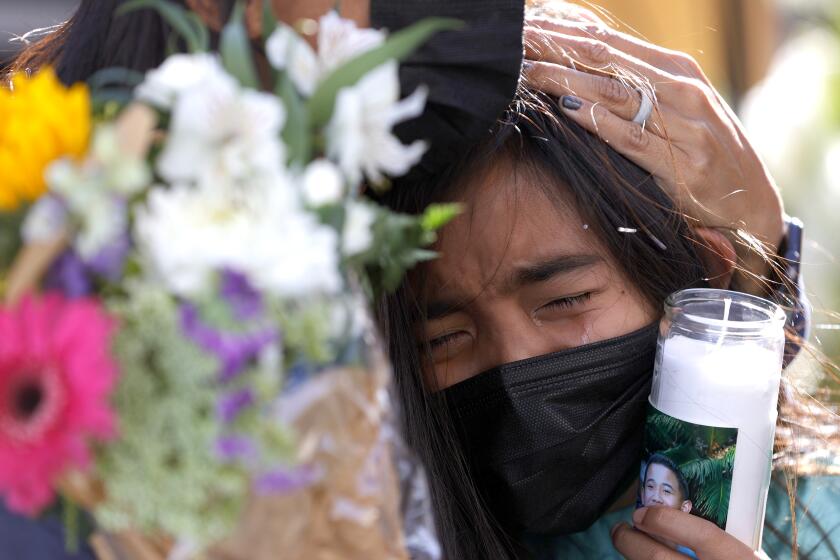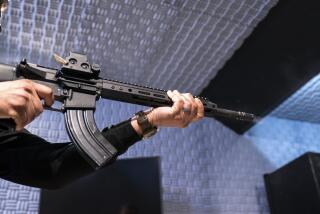After judge overturns California assault weapons ban, state officials vow to fight back

- Share via
Families of mass shooting victims, gun control advocates and California officials condemned a federal judge’s decision to overturn California’s 30-year-old ban on assault weapons, largely because of the manner in which he justified his ruling.
In declaring the ban unconstitutional late Friday, U.S. District Judge Roger Benitez compared the AR-15 semiautomatic rifle to a Swiss Army knife, calling it “good for both home and battle.”
Benitez, who was nominated by former President George W. Bush and serves in the Southern District of California, issued a permanent injunction against the law’s enforcement but stayed it for 30 days to give the state a chance to appeal.
California is one of seven states, plus Washington, D.C., that ban assault weapons, according to the Brady Campaign to Prevent Gun Violence.
In his 94-page ruling, Benitez wrote that it was unlawful for California to prohibit its citizens from possessing weapons permitted in most other states and allowed by the U.S. Supreme Court. Advocates for the right to bear arms hailed the ruling.
“This is by far the most fact-intensive, detailed judicial opinion on this issue ever,” said Dave Kopel, an adjunct professor of constitutional law at the University of Denver and adjunct scholar at libertarian think tank the Cato Institute.
State Atty. Gen. Rob Bonta called the decision “fundamentally flawed” and said he would appeal.
“There is no sound basis in law, fact, or common sense for equating assault rifles with Swiss Army knives — especially on Gun Violence Awareness Day and after the recent shootings in our own California communities,” Bonta said in a statement.
Last month, a gunman opened fire at a light rail yard in San Jose, killing nine co-workers and dying of an apparent self-inflicted gunshot wound.
Authorities are still searching for a motive in the shooting, although early indications point to a work-related issue for a man with a troubled past.
Officials said he was armed with three semiautomatic 9-millimeter handguns and 32 high-capacity magazines loaded with additional ammunition.
AR-15s have been used in some of the nation’s deadliest mass shootings, including the attack at Orlando’s Pulse nightclub that killed 49 people in 2016, and one in Las Vegas that killed 58 people in 2017.
“I can assure you — if a Swiss Army knife was used at Pulse, we would have had a birthday party for my best friend last week,” Brandon Wolf, who survived the Florida attack, wrote on Twitter. “Not a vigil.”
Kris Brown, president of the Brady Campaign to Prevent Gun Violence, said the ruling made her do a double-take.
“I have two daughters, and they read dystopian fiction, like the ‘Hunger Games,’ and it was kind of like that,” she said. “It can’t be real. Nobody, ever, who is a thinking human being with a heartbeat, could possibly liken a Swiss Army knife to an AR-15.”
In response to several mass shootings on his watch, President Biden announced in April that his administration would take steps toward greater gun regulation.
They include a proposal to require background checks for self-assembled firearms — so-called ghost guns — and a law that would allow family members or law enforcement agencies to request a court order to take guns away from a person who is a danger to themselves or others. Nineteen states, including California, have already passed such laws.
“Today’s decision is a direct threat to public safety and the lives of innocent Californians, period,” Gov. Gavin Newsom said Friday in a statement. “The fact that this judge compared the AR-15 — a weapon of war that’s used on the battlefield — to a Swiss Army knife completely undermines the credibility of this decision and is a slap in the face to the families who’ve lost loved ones to this weapon.”
The ruling came in response to a lawsuit filed in August 2019 by pro-gun groups, including the San Diego County Gun Owners Political Action Committee, California Gun Rights Foundation, Second Amendment Foundation and Firearms Policy Coalition.
The plaintiffs also included three San Diego County men who said they own legal rifles or pistols and want to use high-capacity magazines in them but can’t, because doing so would turn them into illegal assault weapons under California statutes.
In cases in which the government seeks to limit people’s constitutional rights, such as those guaranteed by the 2nd Amendment, the government has the burden of proving the limitation is helping to advance an important public interest, like reducing mass shootings, Kopel said.
“You’re essentially weighing how much of a burden you are inflicting on law-abiding people versus how much you are reducing whatever problem you’re trying to deal with,” he said. In this case, he said, the judge found that “we’re not getting any reduction in mass shootings, and it’s imposing quite a severe burden on innocent people, like people who want to have these types of firearms for protection in the home.”
Other legal experts found the judge’s reasoning less compelling.
“The judge in this case, in declaring the ban on assault weapons to be a failed policy experiment and therefore unconstitutional, was engaging in his own policy judgment,” said Susan Estrich, professor at the USC Gould School of Law. “His very reasoning undercuts his own conclusion.”
California became the first state to ban the sale of assault weapons in 1989 in response to a shooting at a Stockton elementary school that left five students dead. The ban, signed into law by Republican Gov. George Deukmejian, has been updated multiple times since then to expand the definition of what is considered an assault weapon.
Each time, those who owned the firearms before they were prohibited were required to register them. There are an estimated 185,569 such weapons registered with the state, Benitez said.
In response to the ban soon after it was enacted, the 9th Circuit Court of Appeals found the 2nd Amendment applied only as a limitation on the federal government, not state governments, Kopel said.
But in 2010, the U.S. Supreme Court issued a landmark ruling saying the 2nd Amendment applies to cities and states, which helped pave the way for this decision, he said.
In the current case, the state attorney general’s office argued that assault weapons are more dangerous than other firearms and are disproportionately used in crimes and mass shootings. Similar restrictions have previously been upheld by six other federal district and appeals courts, the state argued.
But the judge said the firearms targeted by the ban are most commonly used for legal purposes.
In a recent 25-year period, nearly a quarter of all mass workplace shootings nationwide took place in California, according to researchers.
“This case is not about extraordinary weapons lying at the outer limits of 2nd Amendment protection,” he wrote. “The banned ‘assault weapons’ are not bazookas, howitzers, or machine guns.”
“In California, murder by knife occurs seven times more often than murder by rifle,” he added.
The state is also appealing two other rulings by Benitez: one from 2017 that overturns a ban on buying and selling magazines that hold more than 10 bullets, and another from April of last year that blocks a 2019 law requiring background checks to buy ammunition.
In the case of the assault weapons ban, the decision will almost certainly be stayed beyond 30 days, pending an appeal to the 9th Circuit Court of Appeals, and there’s an excellent chance the court will issue a reversal, given its liberal tendencies, Estrich said.
“Ultimately,” she said, “the question may be whether the United States Supreme Court, with its new conservative appointees, sees this as an opportunity to dig into assault weapons bans.”
That could imperil gun control laws that are on the books across the country, Brown said.
“The Supreme Court overturning these kinds of laws that are designed to promote public safety has huge negative implications, not only for assault weapons bans but for every public safety law that we have ever crafted to regulate guns, including the Brady law.” she said, referring to the 1994 requirement that firearm purchasers undergo federal background checks.
“So yes, I’m very concerned about it.”
More to Read
Sign up for Essential California
The most important California stories and recommendations in your inbox every morning.
You may occasionally receive promotional content from the Los Angeles Times.














